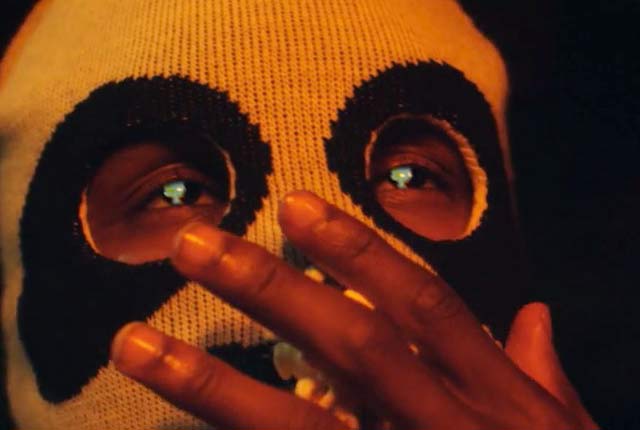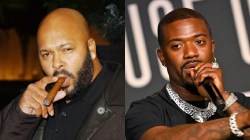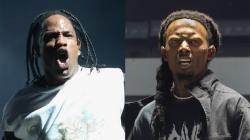Once upon a time long, long ago, producers toiled away on their equipment in basements, attics and studios. Beats were sold, albums were made and checks were cashed. Occasionally, some of them ended up with labels or pressing and distribution deals, and the process was repeated. Anyone that dared upset the status quo was criticized for selling out or crossing over. Fast-forward to 2013, and Dr. Dre is more known for his Beats empire than actual beats, while DJ Premier, generates his own checks and also cashes in from work with Nike and Christina Aguilera. As Biggie once rhymed, “Things done changed.”
While primarily know them for their work with 50 Cent (“21 Questions”) and G-Unit, Bruce Waynne and Dirty Swift of Midi Mafia either saw the aforementioned changes coming years before anyone else or very quickly adapted to Hip Hop’s new economics. In addition to Top 40 projects with Justin Bieber and Jennifer Lopez, Midi Mafia has created an environment that helps foster emerging talent such as Frank Ocean and BeBe O’Hare. Meanwhile the checks roll in from Viacom/MTV, YouTube and other sources. It all adds up to creative control, no compromise and access to millions of fans from all genres. It’s the most literal definition of the term “music business.”
Midi Mafia’s Unplanned Crossover Into The Top-40
HipHopDX: You guys had some early credits for Bad Seed and Angie Martinez, but I get the feeling both of you had aspirations bigger than producing on underground projects. What was your mentality when taking the A&R position?

AD LOADING...
Bruce Waynne: I think it’s just growth, and we were basically learning. [At first], I didn’t even know that you could make money off of selling beats. It was very foreign at the time, and I didn’t understand what Billboard was. So these last 10 years have been like a working internship. As time went on, we just learned more, and it was like, “Oh, you can do a song? Somebody writes the song, and then—boom! You’ve got a record.” The next thing you know, we had “When I See U” for Fantasia. Our aspirations were always to make good music and to make sure we had good people cutting the [records]. It just kept rolling.
DX: That’s some serious growth, considering that you both essentially began on the artist level…
Bruce Waynne: Everything that has been successful has come from following our gut instincts. We’re just genuinely fans of this. We ended up working with Justin Bieber because Swift was like, “Yo, this guy is from Ottawa, Canada? Of course we’ll do it!” We didn’t even hear any music. We just realized we were the first guys Bieber was going in the studio with, and we had some great songs that they liked. We met Scooter Braun, and the whole process of getting in the studio and working was very natural. They were fans of what we did, and we were fans of what they were doing.
Angie Martinez just happened. It was all from growth and being fans of both the music and the people we were working with. Some stuff was just a check, but a majority of the stuff was with people we were fans of. It was never a case where we said, “Oh let’s go do some R&B, and after that we can try to do some Pop.” It was more like, “J-Lo? Oh shit, she looks good. I would love to be in the studio with her.” She heard the music, we worked, and then the next thing you know, we had a number one international hit. Even then, it’s like, “Oh shit, J-Lo touched Swift’s knee!”

AD LOADING...
DX: As producers and songwriters, how does the collaborative process differ with an established artist like Jennifer Lopez versus with a new artist like Bieber was at the time?
Dirty Swift: I don’t think we approach it any differently. With someone like Justin Bieber, we didn’t really know anything about him. So you spend some time figuring out his strengths and weaknesses and what can we bring to the table. Do we put a team around him to make it make sense? Who do we bring in? What to we need to do? Every artist is different, so you evaluate their needs, identify those components and put them in place. Sometimes it’s really simple. They hear a song they like, they cut it, and that’s that. Other times, it’s more involved and you build a sound. But it has nothing to do with the artist being new or not.
Bruce Waynne: Any relevant artists are looking to reinvent themselves on the next project; technically making them like new artists. The difference with a new artist is that they’re looking to become established. It’s almost the same thing, and it doesn’t really change. It’s about us trying to take it to the next level regardless.
Midi Mafia Recall Working On Frank Ocean’s Nostalgia, Ultra

DX: Do you find yourselves just conversing with artists, and those conversations subsequently becoming tracks?

AD LOADING...
Dirty Swift: I think that happens the longer you work with an artist. Take Frank Ocean, for example. We would have long, long conversations just about music. Bruce would say, “Hey, you need to go listen to the Beatles.” Then he would go listen to the Beatles, come back, and we’d have more conversations. We’d end up doing a track, and that influence would kind of pop up out of it. You just keep experimenting. When you have that longer-term relationship with an artist you’re vibing with, those things happen all the time.
DX: The partnership with Frank Ocean seemed to be a really organic one that worked out well for everybody…
Bruce Waynne: We were working with Brandy and James Fauntleroy, who we’re huge fans of. And we met Frank Ocean, because he was one of the writers. We just kind of kicked it and realized that our musical tastes aligned. He was like, “Yo, I’d like to come to the studio.” And in the process of coming to the studio and working on his craft, we placed a lot of records. The next thing you know, we did a mixtape, he got a deal and got a publishing deal. Everything that we did together built that up. But it was just genuinely from being fans, liking what each other was doing and then making good music.
How Midi Mafia Adapted To The Music Industry’s Changing Economics
DX: It’s interesting, because if you follow the trail of Midi Mafia production credits, the time you guys were only known as producers is relatively short. You almost started off as A&Rs…

AD LOADING...
Bruce Waynne: Yeah, I think that’s very true. I think you should write that very bold in this article so we can get a label check…if that still exists [laughs].
Dirty Swift: I think we learned really quickly once the game started to change and shrink. Now A&Rs are managers, and there are three or four hats to wear. I think we looked at it as, “We can’t just make beats anymore, now we have to make songs.” Then it’s like, “Shit, where do you find the songwriters?” You’ve got to find the songwriters yourself and cultivate the talent. The songwriters become the artists, and then the artists become something else. There are all these boundaries that you have to erase, and just do everything. These days, there’s no one place where we’re making all of our money. You may get a TV check, a YouTube check some upfront checks for this, that and the other, and maybe some royalty checks. It’s all over the place, whereas 10 years ago you could be comfortable just selling beats. You could use samples without giving up any of your publishing then. The mentality was, “Shit…whatever, it’s just a sample. We might not get any of the publishing, but we just made $300,000 up front.”
Bruce Waynne: The record industry used to be a cash in hand business, and it’s not like that anymore. Now it’s more like an investment. You have to invest in whatever you’re doing…
Dirty Swift: You’ll get on a project for free if you have to. You can make your publishing later if you have to…you get that placement?

AD LOADING...
Bruce Waynne: It’s all back-end now…
Dirty Swift: That’s not saying we’re doing shit for free now [laughs]. Nah, but the philosophy is like real estate. Publishing is like real estate, so get as much of that as you can and leverage it later. When the song gets placed in a TV show or a movie, you get paid on the back end.
DX: You guys have a lot of partnerships and a lot of revenue streams, is the standard agreement where you do business with a record label irrelevant?
Bruce Waynne: Everything has to really justify a means now. You can’t count out a record label deal, because it depends on what the content is. For example, if you have an artist with a strong underground following, and the record label goes, “Hey, we wanna give you tons of money and take what you’re doing to the next level,” but they want you to change what you’re doing then that won’t make sense. It’s not going to work. But if a label says, “Keep doing what you’re doing, and we’ll bankroll it,” then they’re investing in you. It makes sense. The difference now, is that we’re not focused on a record label. Maybe Mountain Dew may want to do the same thing.

AD LOADING...
That’s the reason the partnership we have with Viacom and MTV is working so well. It gives us the opportunity to build something, create integrity, and then have multiple options. We used to just make a beat then try to get it on an artist’s project. Now we’ve got apps, television shows, film and so many different outlets. Before it was just one way to do it. So we graduated from the record industry perspective to thinking about the music industry perspective. They’re really two different things now.



